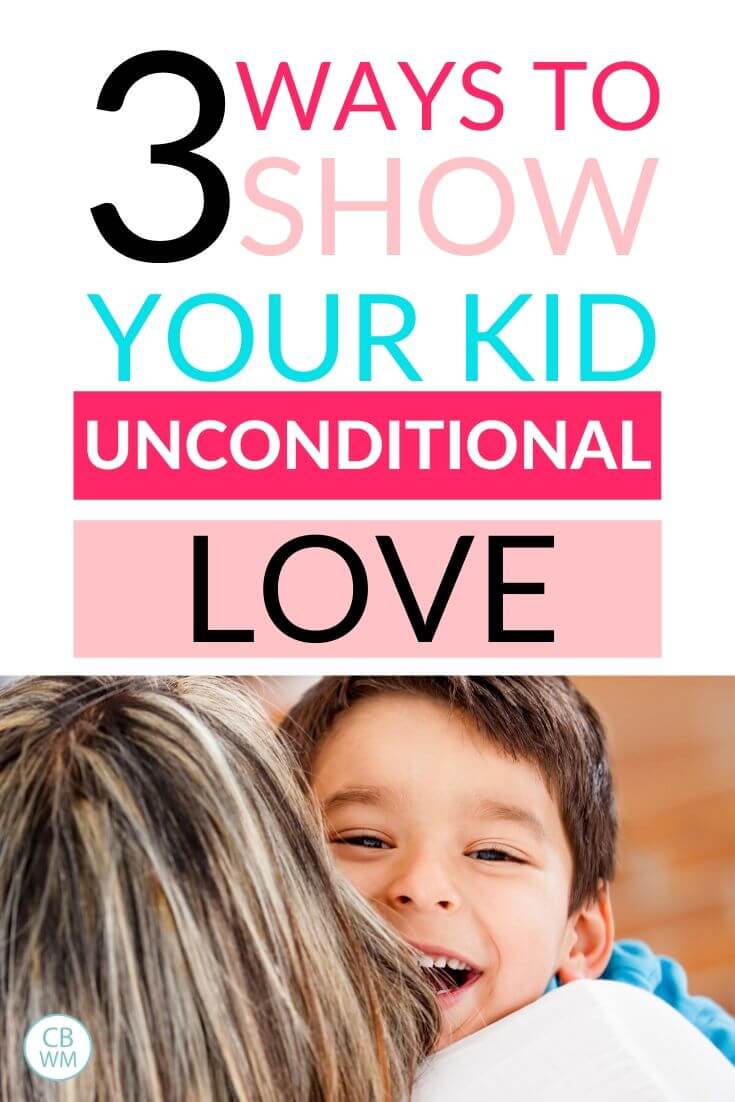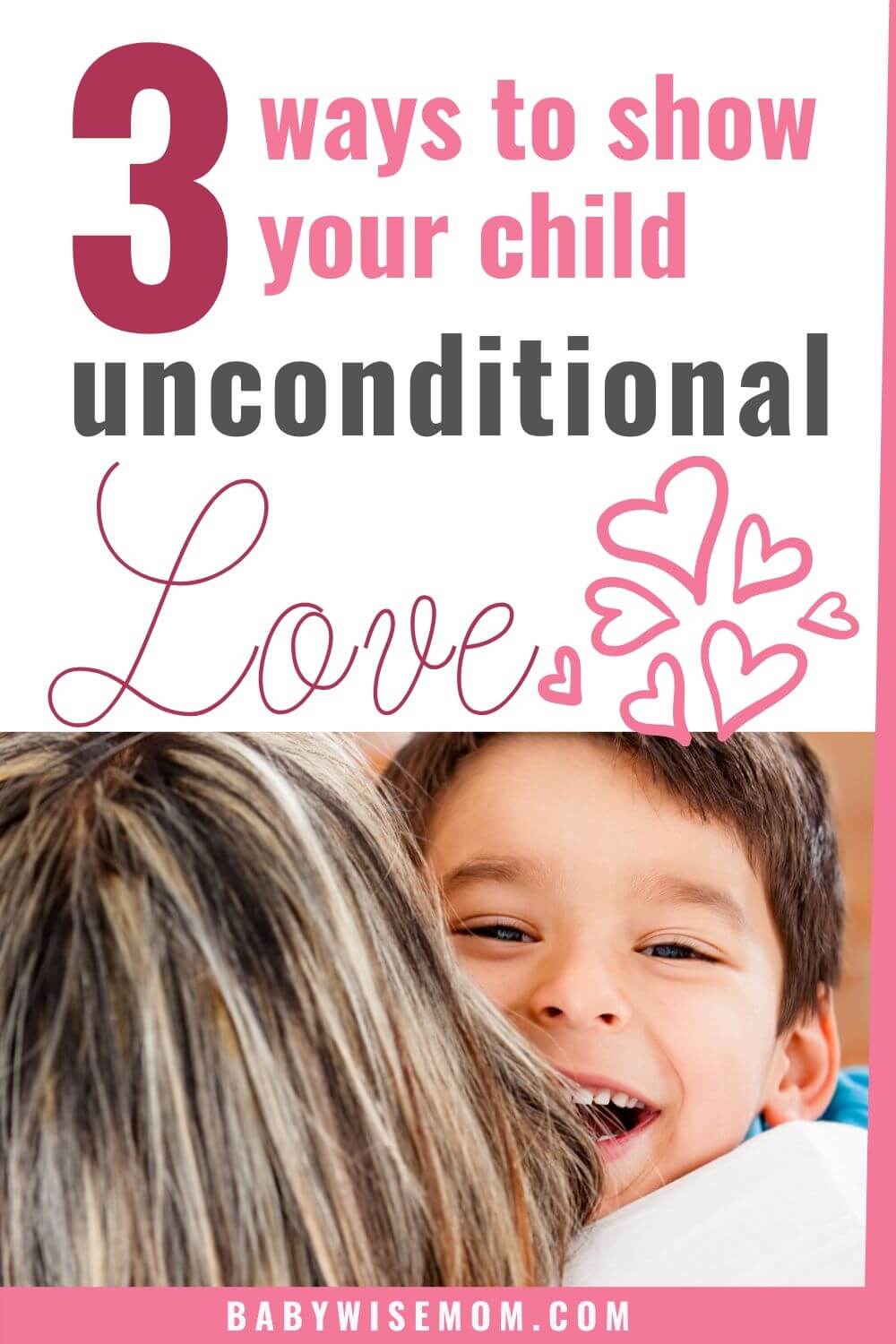Want to know the best ways to show your child unconditional love? Find three ways to show unconditional love to your child in this post.

I think we have all felt those moments when we logically know someone love us but we just don’t feel that love.
The Five Love Languages of Children talks about the absolute need for showing unconditional love toward your children.
You might be scratching your head and thinking, “Of COURSE I love my children unconditionally. That goes without saying.”
While this is true, there is a difference between feelings you have and feelings you show.
There is also a difference in the interpretation of those feelings.
The only reality that matters to your child is your child’s reality.
We parents need to take note of our child’s personal reality, especially in situations like feeling love. We can help them look at life and try to see things from other’s perspectives, but we need to be careful we are working within their perspective and respecting it.
You might love your child. You might even do your best to show love to your child.
Now comes the most important question: does your child feel loved?

Post Contents
How to Show Unconditional Love to Your Child
Does your child feel loved.
How do we attain a YES to that question?
Identify Your Child’s Primary Love Language
First, we must identify our child’s primary love language.
Remember you can’t be sure of a primary love language before age 5.
Read: How and Why of Knowing Our Children’s Love Language
Also, remember that we want to make our children multi-lingual, so we want to show love in all five ways.
We need to be sure we are showing love in each way no matter what the primary love language is.
Even while we make an effort to show love in all five ways, if our child is old enough to have a primary love language identified, we need to pay extra special care to that love language.
Read: Identifying Your Child’s Primary Love Language
Show Love To Your Child No Matter What
Next, you need to show love to our children no matter what.
No matter what.
To many new parents, this sounds easy. You can’t imagine not always showing love to your sweet little bundle.
Let me elaborate.
No matter how big the tantrum. No matter how many times you have told her to not touch that vase. No matter how many times you have asked him to share with his sister. No matter how many times she has whined today (has she stopped?).
You show love.
No matter what.
Remember–show the love no matter what. Not just feel love.
This means you don’t withhold love. Not even when she is being a terror.
You allow her to cuddle up on your lap even when her actions are frustrating for you. You still offer words of encouragement when behavior isn’t up to par. You still do nice things for your child when he refuses to do nice things for his siblings. You don’t take gifts back with a “you just aren’t being very good. I don’t think I want to give this to you after all.” You still spend time with your child.
Always show love.
Don’t manipulate. Don’t use these ways of showing love as weapons in times of conflict.
It doesn’t mean you can’t discipline. It doesn’t mean you can’t train. It doesn’t mean you don’t correct your child. It doesn’t mean you must spoil your child.
You still can, and should, discipline and train. You still want to avoid spoiling. Loving a child is not spoiling a child.
When you discipline a child, you want to show your child great love afterward. This can look like you taking away a privilege and then sitting and holding your little one as he cries about it.
The Five Love Languages of Children asserts that when a child feels loved, discipline is easier and more effective.
Consider this. Let’s say your spouse is unhappy with something you did. He comes to talk to you about it.
Let’s say you haven’t been feeling very loved lately. Your love language is quality time and there hasn’t been much of that going on.
How sensitive are you going to be to his words? How would you feel if he said, “I don’t want to spend time with you right now. You just have really upset me so I am not going to spend time with you.” (that just reminds me of kids saying, “I am not going to be your friend anymore!”).
Now let’s say instead that you know without a doubt that your spouse loves you. He spends time with you–even sacrificing other things to spend time with you.
Now how do you feel about his complaint? A bit better?
Criticism is never easy to take, but always easier coming from someone you know loves you.
Remember That Children are Children
Third, Remember Children are Children
In order to help yourself love your children unconditionally, consider these 3 obvious statements about children. This is found on page 21 of The Five Love Languages of Children .
- Children are children
- Children act like children [read–sometimes they mess up. They make messes. They whine. They complain. They are selfish…]
- Much childish behavior is unpleasant
Yep. Kids are kids.
Sometimes that is frustrating to deal with. It shouldn’t be surprising. Adults can be frustrating to deal with. Why would kids be any different?
But let’s remember that for the most part, children want to please their parents so long as they believe it is possible to do so. Children are loving and forgiving (good thing for that!).
Children are wonderful. Wonderful little people trying to figure out what to do and how to do it. Keep these things in mind and show them your love at all times. No matter what.

Conclusion
While it is important to work on showing unconditional love to your child, do not despair when you mess up.
Notice I said when and not if.
You will mess up.
When that time comes, take the opportunity to apologize to your child and resolve to do better in the future. These moments of mistake are a great opportunity for your child to learn about forgiveness.
RELATED POSTS
This post originally appeared on this blog February of 2010
